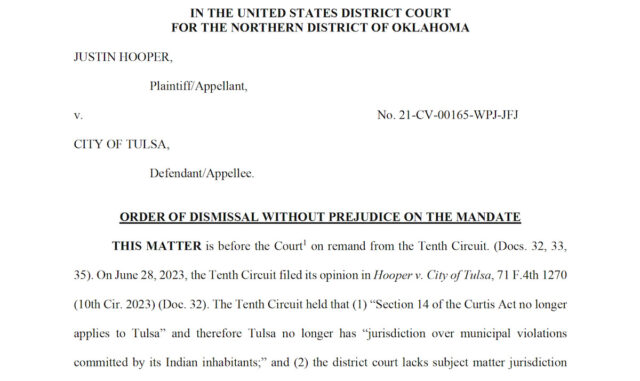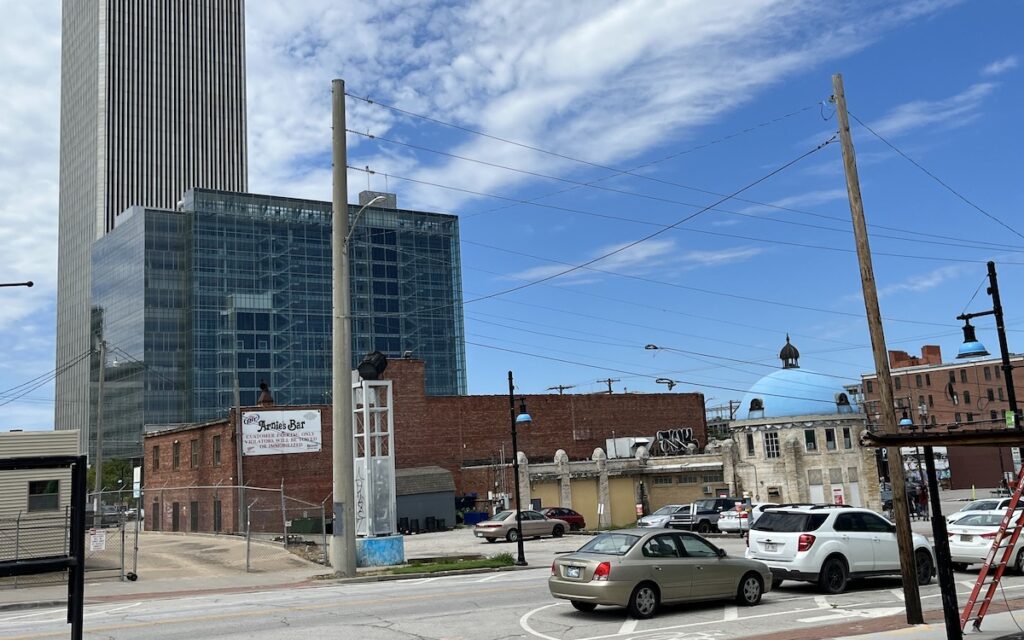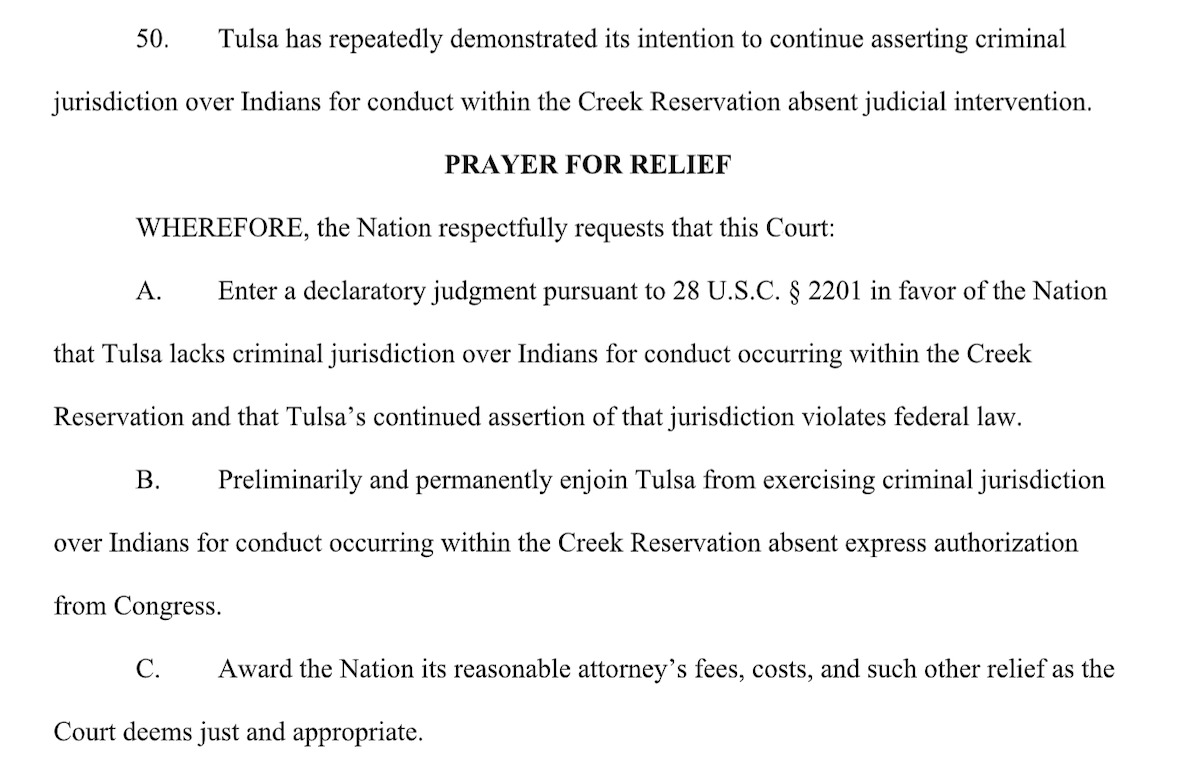
A federal judge dismissed Hooper v. Tulsa without prejudice today, following the mandate of an appellate court that ruled the Curtis Act of 1898 does not grant the City of Tulsa jurisdiction to adjudicate local infractions made by tribal citizens.
The decision means disagreement over whether cities in eastern Oklahoma can hear traffic cases in municipal court within Indian Country reservation boundaries will play out in a separate federal lawsuit filed in November.
“As a matter of Tenth Circuit law, Section 14 of the Curtis Act no longer applies to Tulsa and therefore Tulsa no longer has jurisdiction over municipal violations committed by its Indian inhabitants,” U.S. District Judge William P. Johnson wrote in his order.
Johnson stopped short of entering a declaratory judgement regarding applicability of the Curtis Act — a law predating Oklahoma statehood that legislated land allotment — to other cities in eastern Oklahoma.
“Plaintiff has suggested the court should enter a declaratory judgment regarding non-applicability of the Curtis Act to other Oklahoma municipalities. However, the court lacks jurisdiction to render declaratory relief on issues and matters unrelated to plaintiff and involving entities that are not parties to this proceeding,” Johnson stated in his order.
Jason Salsman, the Muscogee Nation’s communications director, said the tribe appreciated Friday’s decision, which comes more than three years after the U.S. Supreme Court affirmed the Muscogee Reservation’s continued existence in eastern Oklahoma. In their McGirt v. Oklahoma decision, justices noted that only tribes and the federal government have jurisdiction to prosecute tribal citizens within Indian Country reservations.
“The parties behind these politically driven cases are working to make Oklahoma less safe by overturning the McGirt decision. The McGirt decision has meant more police, courts, and prosecutors working to keep our communities safer. Every Oklahoman deserves to be safe in their community,” Salsman said. “That is why we have been asking Congress to pass legislation to fully empower tribes to prosecute anyone who violates the law on our reservations.”
Michelle Brooks, director of communications for the City of Tulsa, said city leaders had no comment Friday on the dispute, which has significant financial implications for city governments and tribal governments, depending where cases are adjudicated.
“This is one of several cases currently pending in state and federal courts to address the same issues, so the city has no further comment,” Brooks said.
City files for dismissal in related lawsuit
In a separate federal case filed by the Muscogee (Creek) Nation against the City of Tulsa last month, the tribe is arguing that the city’s continued assertion of criminal jurisdiction over tribal citizens violates federal law. The city, meanwhile, is arguing that authority beyond the Curtis Act exists to grant municipalities jurisdiction within the Muscogee Nation.
“There is no legal basis for current city policies dealing with citizens of tribal nations, and we are asking the court to require the city to follow the law,” Geri Wisner, Muscogee Nation attorney general, said the day the lawsuit was filed.
Attorneys for the City of Tulsa filed a motion seeking dismissal of that lawsuit Dec. 8. In their brief, attorneys for the city argue that the U.S. Supreme Court’s ruling in Oklahoma v. Castro-Huerta showed that the state has a strong presumption in favor of their ability to prosecute tribal citizens. Therefore, Tulsa’s attorneys argue, the city should have jurisdiction over adjudicating municipal citations — such as traffic tickets — against Indigenous citizens.
In a footnote at the bottom of Johnson’s order Friday, he wrote that the federal court could address the implications of Castro-Huerta in the Muscogee Nation v. City of Tulsa lawsuit.
“That case is the proper venue for the city to raise their other matters, not here,” wrote Johnson, a judge in the U.S. District Court of New Mexico who has been assigned the case. “The Tenth Circuit chose not to address Castro-Huerta in its decision and this court similarly declines to address it.”
So far, courts have read the Castro-Huerta decision more narrowly, finding that the case held the state has jurisdiction over non-Indians who commit crimes against Indians within Indian Country, a term of legal art that describes territory over which states generally do not have jurisdiction over tribal citizens. Any ruling that the state of Oklahoma or its subdivisions do have jurisdiction over crimes committed by Native Americans in Indian Country would be a new development of the law.
Attorneys for the City of Tulsa also argue that other pending cases can resolve the municipal citation jurisdiction issue without new litigation. The city points to Stitt v. City of Tulsa and City of Tulsa v. O’Brien, two cases pending before the Oklahoma Court of Criminal Appeals, that involve similar legal facts. Notably, the Muscogee Nation’s lawsuit against Tulsa was filed in federal court, meaning its outcome could make the state cases moot.
Background on Tulsa v. Hooper

In 2018, Justin Hooper, a Choctaw Nation citizen, received a $150 speeding ticket within Tulsa’s city limits and the boundaries of the Muscogee Nation. In July 2020, the U.S. Supreme Court affirmed the Muscogee Nation as an Indian Country reservation. Five months after the SCOTUS ruling, Hooper filed an application for post-conviction relief, arguing that Tulsa lacked jurisdiction to prosecute him for the offense in municipal court.
RELATED
Muscogee Nation sues City of Tulsa in latest jurisdictional fight by Joe Tomlinson
After the federal district court initially dismissed the case in Tulsa’s favor, Hooper appealed to the 10th Circuit Court of Appeals. The appellate court reversed the district court’s ruling in June, saying that Section 14 of the Curtis Act no longer applies and, therefore, could not be cited to claim Tulsa retains jurisdiction to adjudicate city rules and regulations.
The City of Tulsa requested a formal stay of the appellate ruling, which was briefly granted in August before ultimately being rejected by U.S. Supreme Court Justices Brett Kavanaugh and Samuel Alito, who essentially deemed the stay unnecessary.
Read the dismissal order in Hooper v. Tulsa
